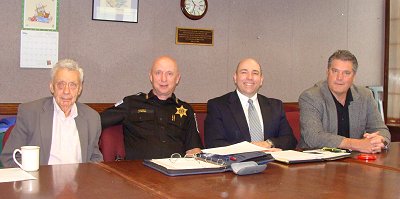- By Dan Veaner
- News
 Print
Print  Some roads seem to scream for speed. Add a rockin' beat on the radio, and a late start and you are jammin' even on Tompkins County's neighborhood roads. It poses danger to children and pedestrians, not to mention motorists. That prompted Tompkins County Sheriff Ken Lansing to launch 'Wise Up, Slow Down' Monday. The unique initiative joins law enforcement agencies to focus on trouble spots using data collected by various county agencies.
Some roads seem to scream for speed. Add a rockin' beat on the radio, and a late start and you are jammin' even on Tompkins County's neighborhood roads. It poses danger to children and pedestrians, not to mention motorists. That prompted Tompkins County Sheriff Ken Lansing to launch 'Wise Up, Slow Down' Monday. The unique initiative joins law enforcement agencies to focus on trouble spots using data collected by various county agencies."This obviously makes sense," Lansing says. "Somebody had taken the time to do a very in-depth study with a lot of data, and narrow down for us to addresses their concerns. I contacted the Cayuga Heights Police Department, the Ithaca Police Department, Cornell Police, and the State Police. All of them have graciously accepted the invitation to be a part of this."
The idea uses existing data to identify areas of Tompkins County that are actual trouble spots, rather than just the neighborhoods where the complaints are the loudest. It began when County Legislator Peter Stein (Town of Ithaca) attended neighborhood meetings. Stein noticed a theme: residents felt that speeding had gotten out of hand.
"One thing that I heard wherever I went was that people felt there is a serious speeding problem in the county," he says. "These were all residential neighborhoods where people said they used to be able to go out and walk by the street. Now they can't any more."
Stein recruited Ithaca-Tompkins County Transportation Council Staff Director Fernando de Aragón and Planning Analyst Tom Mank to research data from the Sheriff Department, the Department of Public Works, and other sources to scientifically identify county locations where speeding is particularly problematic. They worked for a year collecting and interpreting the data with the idea that focusing on actual trouble spots would be a better use of limited and dwindling county resources.
"We decided to look at all the data that we had in the county on accidents, on road volume, on speeding, on all the roads that we had and look at them and see where the most serious speeding problems are," Stein says. "We then went to talk to the Sheriff, and were pleased that he was enthusiastic about this."
To further conserve resources the speeding enforcement effort is being integrated with a two-week focussed enforcement initiative to make sure drivers and passengers are wearing seat belts. Lansing says New York State has about 80% compliance with the seat belt law, and is looking to up that number, especially for night drivers. By placing those stopping points in scientifically identified speeding zones, law enforcement officials say they will get two for one with the recourses they do have.
"We, of course, are severely pressed financially," Stein says. "It's getting worse all the time. We have very few resources for speeding monitoring. All my life I have heard, when there is a speeding enforcement, someone says 'oh they're trying to get money.' It's not about that at all. The County gets no money from a traffic ticket. The town gets some money, but it's a small amount. Most of the money goes to the state. You're not going to fill your coffers with traffic tickets. It's a question of quality of life. Our constituents complain, and we want to do something to meet their concerns."
"Our hope is that maybe we won't get anything because maybe people will pay attention," Lansing adds. "We want them to know we're not going to name the streets we're on, but for the next couple of weeks and after that we'll coordinate our efforts to concentrate on this."
 (Left to right) Tompkins County Legislator Peter Stein, Sheriff Ken Lansing, Cayuga Heights Police Chief Tom Boyce, Legislator Brian Robison
(Left to right) Tompkins County Legislator Peter Stein, Sheriff Ken Lansing, Cayuga Heights Police Chief Tom Boyce, Legislator Brian RobisonStein notes that too few areas in Tompkins County are known for aggressive speed limit enforcement, and he hopes that more of the county will earn that reputation that is most notable in Cayuga Heights.
"The Cayuga Heights Police Department is known for our vigorous vehicle traffic law enforcement. It's a very natural thing for us to get involved with the Sheriff on this program," says Cayuga Heights Police Chief Tom Boyce. "We're happy to do it. Even though the targeted roads aren't necessarily in the Village of Cayuga Heights they are on the outer sides of the Village. We'll target those areas to make sure we can help make this program turn out very well."
Officials say that while they are announcing the launch of the program, they will not likely announce when future implementations will be, though there will likely be a repeat in the Fall when students return to Ithaca. Legislator Brian Robison (Groton) says that even he isn't being told where speeding enforcement hot spots are located. He adds that data sharing between departments makes 'Wise Up, Slow Down' unique.
"It's not just a law enforcement thing," Robison says. "They used data from the Department of Public Works and other departments. So it's really a cooperative effort, not only among law enforcement agencies. Everybody collects their own data. Now the idea is to share that data to come up with something like this. We all remember 9/11. It probably could have been avoided had all those data systems been working in conjunction with one another. They are now. This was a great idea."Lansing says deputies will be graphing results to help focus future speed enforcement initiatives.
"One of the first things we want to do is to make these roads safer so people can get back to doing the things they enjoy," he says. "Any time we do this people have to understand this is an educational thing. The slogan is 'Wise Up, Slow Down.' That's a great slogan, because that's what we want. We don't get anything out of this financially and we know things are tough on the people out there driving every day. But a serious accident is just that and we don't like telling people their loved ones have been injured or passed away. That's why we do it. We're willing to take the initiative to do what must be done."
v7i20



